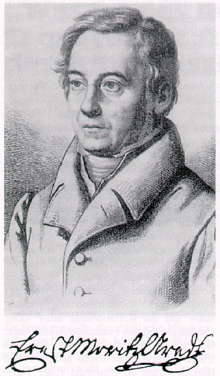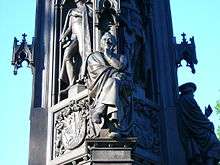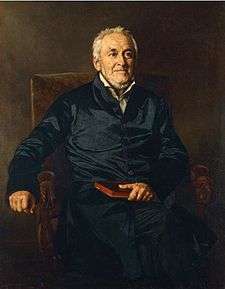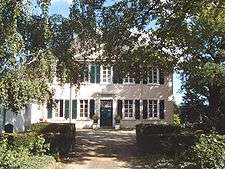Ernst Moritz Arndt


Ernst Moritz Arndt (26 December 1769 – 29 January 1860) was a German nationalist author and poet. Early in his life, he fought for the abolition of serfdom, later against Napoleonic dominance over Germany. Arndt had to flee to Sweden for some time due to his anti-French positions. He is one of the main founders of German nationalism and the 19th century movement for German unification. After the Carlsbad Decrees, the forces of the restoration counted him as a demagogue.
Arndt played an important role for the early national and liberal Burschenschaft movement and for the unification movement, and his song "Was ist des Deutschen Vaterland?" acted as an unofficial German national anthem.
Long after his death, his anti-French propaganda was used again, in both World Wars. This, together with some strongly antisemitic and anti-Polish statements, has led to a highly critical view of Arndt today.
Early life and studies
Arndt was born at Gross Schoritz (now a part of Garz on the island of Rügen), then in Swedish Pomerania, as the son of a prosperous farmer and emancipated serf of the lord of the district, Count Putbus. His mother came of well-to-do German yeoman stock. In 1787 the family moved to Stralsund, where Arndt was able to attend the academy. After an interval of private study he went in 1791 to the University of Greifswald as a student of theology and history, and in 1793 moved to Jena, where he came under the influence of the German idealist philosopher Gottlieb Fichte.
After the completion of his university studies he returned home, and for two years was a private tutor in the family of Ludwig Koscgarten (1758–1818), pastor of Wittow on Rügen, and having qualified for the ministry as a candidate of theology, he assisted in church services. At the age of 28 he renounced the ministry, and for 18 months led a life of traveling, visiting Austria, Hungary, Italy, France and Belgium. Turning homewards up the river Rhine, he was moved by the sight of the ruined castles along its banks to intense bitterness against France. The impressions of this journey he later described in Travels in parts of Germany, Hungary, Italy and France in 1798 and 1799.
Opposition to serfdom and Napoleonic rule

In 1800 he taught at the University of Greifswald as an independent lecturer (privatdocent) in history, and the same year published Über die Freiheit der alten Republiken. Germanien und Europa appeared in 1803, a "fragmentary outburst," as he himself called it, on his views on French aggression. This was followed by one of his most influential books, Geschichte der Leibeigenschaft in Pommern und Rügen (Berlin, 1803), a history of serfdom in Pomerania and on Rügen, which was so convincing an indictment that King Gustav IV Adolf of Sweden in 1806 abolished serfdom.
Arndt had meanwhile risen from privatdocent to extraordinary professor, and in 1806 was appointed to the chair of history at the university. In this year he published the first part of his Geist der Zeit, in which he flung down the gauntlet to Napoleon and called on countrymen to rise and shake off the French yoke. So great was the excitement it produced that Arndt was compelled to take refuge in Sweden to escape the vengeance of Napoleon.
Settling in Stockholm, he obtained government employment, and devoted himself to the great cause which was nearest his heart. In pamphlets, poems and songs, he communicated his enthusiasm for German independence to his countrymen. Schill's heroic death at Stralsund prompted him to return to Germany, and in disguise he reached Berlin in December.
In 1810 he returned to Greifswald, but only for a few months. He again set out on his adventurous travels, lived in close contact, with notable men of his time, such as Gebhard Leberecht von Blücher, August von Gneisenau and Heinrich Friedrich Karl Stein, and in 1812 was summoned by the last named to St Petersburg to assist in the organization of the final struggle against France. Meanwhile, pamphlet after pamphlet, and his stirring patriotic songs, such as Was ist des Deutschen Vaterland?, Der Gott, der Eisen wachsen ließ, and Was blasen Trompeten? became widely popular.

When, after the peace, the University of Bonn was founded in 1818, Arndt was appointed to teach from his Geist der Zeit, in which he criticized the particularist policies of the German principalities. The boldness of his demands for reform offended the Prussian government, and in the summer in 1819 he was arrested and his papers confiscated.
Although speedily liberated, he was in the following year, at the behest of the Central Commission of Investigation at Mainz – established in accordance with the reactionary Carlsbad Decrees – arraigned before a special tribunal. Although not found guilty, he was forbidden to exercise the functions of his professorship, although he was allowed to retain the stipend. The next 20 years he passed in retirement and literary activity.
In 1840 he was reinstated in his professorship, and in 1841 was chosen rector of the university. The revolutionary outbreak of 1848 rekindled in the venerable patriot his old hopes and energies, and he took seat as one of the deputies to the National Assembly at Frankfurt. He participated in the deputation that offered the Imperial crown to Frederick William IV, and was indignant at the king's refusal to accept it, so he retired from public life.
He continued to lecture and to write with freshness and vigor, and on his 90th birthday received from all parts of Germany good wishes and tokens of affection. He died at Bonn in January 1860, and was buried in Bonn's Alter Friedhof. There are monuments to his memory at Schoritz on Rügen, at the University of Greifswald, and in Bonn.
Arndt was married twice , first in 1800, his wife dying in the following year; a second time in 1817. His youngest son drowned in the Rhine in 1834.
Ethnocentrism, antisemitism
Originally a supporter of the ideas of the French revolution, Arndt dissociated himself from them when the Reign of Terror of the Jacobins became apparent. When Napoleon began to conquer Europe, this renunciation was transformed into visceral dislike.[1]
Like Fichte and Jahn, Arndt began to envision the German nation as a society of ethnic homogeneity, drawing on the history of the German people, especially in the Middle Ages. His writings lack a specific political program, but instead cite external enemies. While "freedom" is often mentioned, the freedom Arndt envisioned was not that of a pluralistic society, but rather of a romanticized national community. The French are denigrated as weakened, womanish and morally depraved, while supposed German virtues are extolled.[1]
"The Germans have not been bastardized by foreign peoples, have not become half-breeds, they more than many other peoples have remained in their native state of purity."[2]
These ideas led Arndt to generate anti-French propaganda during the Napoleonic conquest of the German states:
"When I say I hate the French carelessness, I despise the French daintiness, I disapprove of the French loquacity and flightiness, I may pronounce a flaw, but it is a flaw that I share with all my people. I could likewise say I hate the English presumption, the English prudery, the English seclusiveness. These hated, despised, dispraised characteristics are not yet vices as such, from the peoples that they represent they may come with great virtues which I and my people are lacking. Therefore ... let us hate our Frenchmen, the infamizers and destroyers of our power and virginity, even more, now that we feel how they weaken and enervate our virtue and strength."[3]
Arndt also was prejudiced against Poles and other Slavs, and published an anti-Polish pamphlet in 1831 in which he castigated Polish "barbarity and wildness".[4] During the liberal Revolution of 1848, when the issue of reviving the Polish state was raised in Frankfurt, Arndt declared that "tribes" of Slavs and Wends "have never done or been able to do anything lasting with respect to state, science, or art," and concluded: "At the outset I assert with world history that pronounces judgment [that] the Poles and the whole Slavonic tribe are inferior to Germans."[5]
He also warned of close contact with Judaism. He warned of the "thousands [of Jews] which by the Russian tyranny will now come upon us even more abounding from Poland" – "the impure flood from the East".[6] Moreover he warned of a Jewish intellectual conspiracy, claiming that Jews had "usurped" half of literature.[6]
Arndt paired his antisemitism with his anti-French views, calling the French "the Jewish people" ("das Judenvolk"), or "refined bad Jews" ("verfeinerte schlechte Juden").[7] In 1815 he wrote of the French: "Jews... I call them again, not only for their Jewish lists and their penny-pinching avarice, but even more because of their Jew-like sticking together."[8]
Works
See also German Wikisource.
Poems and songs
Arndt's lyric poems are not all confined to politics. Many among the Gedichte are religious pieces. This is a selection of his best-known poems and songs:
- Sind wir vereint zur guten Stunde ("When we are united in happy times")
- Was ist des Deutschen Vaterland? ("What is the fatherland of the Germans?")
- What is the German’s Fatherland? English German Classics 1900 William Cleaver Wilkinson
- Der Gott, der Eisen wachsen ließ ("The god who let iron grow") . Melody written by Albert Methfessel (1785–1869).
- Zu den Waffen, zu den Waffen ("To the weapons, to the weapons")
- Kommt her, ihr seid geladen (Come here, you are invited), EG 213 (No. 213 in the current German Protestant hymnal Evangelisches Gesangbuch)
- Ich weiß, woran ich glaube ("I know what I believe in", EG 357)
- Die Leipziger Schlacht ("The Battle of Leipzig", Deutsches Lesebuch für Volksschulen (German reader for elementary schools))
Other works
(A selection.)
- Reise durch Schweden ("Voyage through Sweden", 1797)
- Nebenstunden, Beschreibung und Geschichte der Shetländischen Inseln und Orkaden ("Description and history of the Shetland and Orkney Islands", 1820)
- Die Frage über die Niederlande ("The Netherlands question", 1831)
- Erinnerungen aus dem äusseren Leben (1840) An autobiography, and the most valuable source of information for Arndt's life. This is the basis of E. M. Seeley's Life and Adventures of E. M. Arndt (1879)
- Rhein- und Ahrwanderungen ("Peregrinations along the Rhine and Ahr", 1846)
- Meine Wanderungen und Wandlungen mit dem Reichsfreiherrn Heinrich Carl Friedrich vom Stein ("My peregrinations and metamorphoses together with Reichsfreiherr Heinrich Carl Friedrich vom Stein", 1858)
- Pro populo germanico (1854) Originally intended to form the fifth part of the Geist der Zeit.
Biographies
- Schenkel (Elberfeld, 1869)
- E. Langenberg (Bonn, 1869)
- Wilhelm Baur (Hamburg, 1882)
- H. Meisner and R. Geerds, E. M. Arndt, Ein Lebensbild in Briefen (1898)
- R. Thiele, E. M. Arndt (1894).
See also
- Greifswald
- Ernst Moritz Arndt Tower
- Ernst Moritz Arndt University of Greifswald (old German university -former GDR- named after him)
References
- 1 2 Staas, Christian. "Einheit durch Reinheit". Zeit Geschichte (in German) (3/2010): 38–42.
- ↑ Ripper, Werner (1978). Weltgeschichte im Aufriss (in German). 2. Frankfurt: Verlag Diesterweg. p. 191. ISBN 3-425-07379-6.
Die Deutschen sind nicht durch fremde Völker verbastardet, sie sind keine Mischlinge geworden, sie sind mehr als viele andere Völker in ihrer angeborenen Reinheit geblieben...
- ↑ Arndt, E.M. Geist der Zeit (in German). 4. Leipzig. p. 148.
Wenn ich sage, ich hasse den französischen Leichtsinn, ich verschmähe die französische Zierlichkeit, mir missfällt die französische Geschwätzigkeit und Flatterhaftigkeit, so spreche ich vielleicht einen Mangel aus, aber einen Mangel, der mir mit meinem ganzen Volke gemein ist. Ebenso kann ich sagen: Ich hasse den englischen Übermut, die englische Sprödigkeit, die englische Abgeschlossenheit. Diese gehassten und verachteten und getadelten Eigenschaften sind an sich noch keine Laster, sie hängen bei den Völkern, die sie tragen, vielleicht mit großen Tugenden zusammen, die mir und meinem Volke fehlen. Darum lasst uns die Franzosen nur recht frisch hassen, lasst uns unsre Franzosen, die Entehrer und Verwüster unserer Kraft und Unschuld, nur noch frischer hassen, wo wir fühlen, dass sie unsere Tugend und Stärke verweichlichen und entnerven.
- ↑ Germany and Eastern Europe: Cultural Identity and Cultural Differences Keith Bullivant,Geoffrey Giles, Walter Pape, page 144 Jurgen Lieskounig "Branntweintrinkende Wilde" Beyond Civilization and Outside History: The Depiction of the Poles in Gustav Freytag's "Soll und Haben"
- ↑ The apocalypse in Germany Klaus Vondung and Stephen D. Ricks page 112,University of Missouri Press 2001
- 1 2 Schmidt, Jörg (7 September 2009). "Fataler Patron". Die Zeit (in German).
Tausende, welche die russische Tyrannei uns nun noch wimmelnder jährlich aus Polen auf den Hals jagen wird,... die unreine Flut von Osten her.
- ↑ Arndt, E.M. (1814). Noch ein Wort über die Franzosen und über uns. p. 13 ff.
- ↑ Arndt, E.M. (1815). Das Wort von 1814 und das Wort von 1815 über die Franzosen. p. 71.
Juden... nenne ich sie wieder, nicht bloß wegen ihrer Judenlisten und ihres knickerigen Geitzes, sondern mehr noch wegen ihres judenartigen Zusammenklebens.
Further reading
- O.C. Hiss, Kleine Geschichte der geheimen Presse, Vanitas Presse: Berlin, 1946
 This article incorporates text from a publication now in the public domain: Chisholm, Hugh, ed. (1911). "Arndt, Ernst Moritz". Encyclopædia Britannica (11th ed.). Cambridge University Press.
This article incorporates text from a publication now in the public domain: Chisholm, Hugh, ed. (1911). "Arndt, Ernst Moritz". Encyclopædia Britannica (11th ed.). Cambridge University Press. Rines, George Edwin, ed. (1920). "Arndt, Ernst Moritz". Encyclopedia Americana.
Rines, George Edwin, ed. (1920). "Arndt, Ernst Moritz". Encyclopedia Americana.
External links
| Wikimedia Commons has media related to Ernst Moritz Arndt. |
- Works by Ernst Moritz Arndt at Project Gutenberg
- Works by or about Ernst Moritz Arndt at Internet Archive
- Works by Ernst Moritz Arndt at LibriVox (public domain audiobooks)
